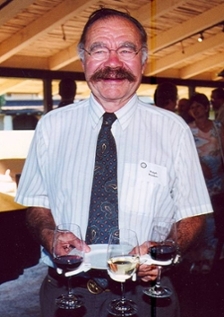
Ralph Kunkee
Professor of Viticulture and Enology, Emeritus
Ralph Kunkee was born July 30, 1927 and lived in Atascadero until he graduated from High School in 1945. He served in the Navy for one year, then earned bachelor’s and doctoral degrees in biochemistry from UC Berkeley in 1950 and 1955.
After receiving his doctorate Ralph worked as a research biochemist for Du Pont in Wilmington, Del. In 1960 he accepted a position as a research biochemist in the Pesticide Residue Research Unit at UC Davis. He joined the Viticulture and Enology faculty in 1963 as an Assistant Professor where he conducted research and taught until his retirement in 1991. For many years, Ralph taught the general education course, Introduction to Winemaking that routinely enrolled over 250 students in each offering. In addition he taught the graduate level and then undergraduate course in Wine Microbiology with both lecture and laboratory components. Over his career more than 1000 students took this specialty course. Most of those students work in the wineries of California, throughout the US and all over the world. Ralph helped establish the Fermentation Science undergraduate major long before this was appreciated as an up and coming field and taught the Fermentation Biotechnology core course of this major from until it became an emphasis of the current Biotechnology major. Even after he retired Ralph was still involved in occasional lectures, consultations and wine judging. Typical of his adventurous and forward-looking nature, he also taught one of the first Distance Learning classes, “Introduction to Winemaking,” through UCD Extension.
Ralph’s major research and teaching interests focused on wine yeast, the nutrition, energetics and characterization of the malolactic fermentation, and the sources and controls of microbiological spoilage of wines. His wine yeast studies addressed the characterization, description and use of various yeast strains and he was active in the promotion of use of commercially produced yeast, a widespread industrial practice conducted today. His work on malolactic fermentation, the secondary fermentation that takes place in winemaking, led to an understanding of this bacterial activity and how to control it. Inoculating with pure cultures of Oenococcus oeni also became standard industry practice. In his honor one species of Lactobacillus, found in wine but now known to be an important bee probiotic, was named Lactobacillus kunkeei in his honor. Ralph also worked on the identification of spoilage microorganisms in wine production such as the now well-known spoilage yeast of wine aging, Brettanomyces bruxellensis and he developed methods for the identification and control of this yeast.
Ralph’s research changed standard winemaking practices in the global wine industry with respect to both yeast and bacterial inoculations and by urging winemakers to use sterile filtration and bottling to improve the microbiological stability of wine. He played a significant role in the transition of the American wine preference from high-alcohol dessert or appetizer wines to the lower-alcohol modern table wines.
Ralph published nearly 150 scientific articles and chapters in books and co-authored two textbooks on enology including the “Principles and Practices of Winemaking” with his colleagues that won the prestigious Prix en Oenologie from the Office International de la Vigne et du Vin (OIV) in 1998. Although published two decades ago in 1996 this book remains a widely cited and popular textbook in winemaking and was translated into Chinese and Spanish editions shortly after it appeared.
Equally important to his research and teaching accomplishments is Ralph’s legacy as larger than life persona in the global wine industry and the Davis community. Ralph was a wonderful, warm person. His hospitality and enthusiasm for life was legendary and it was impossible to not have a good time in his presence, especially when he would flash his trademark smile under that bushy mustache, inevitably with a glass of wine in one of his hands.
At his celebration of life ceremony, people spoke of his huge effect on their lives. He was always ready to visit and assist a winery in need of technical assistance, often offered programs for home winemakers and consumers, and was a fixture at wine tasting competitions elevating the participation of all judges. Ralph often said we were not here to serve the wine industry but to serve the public in supporting the financial well-being of the industry.
Linda Bisson
Roger Boulton
Ann Noble
